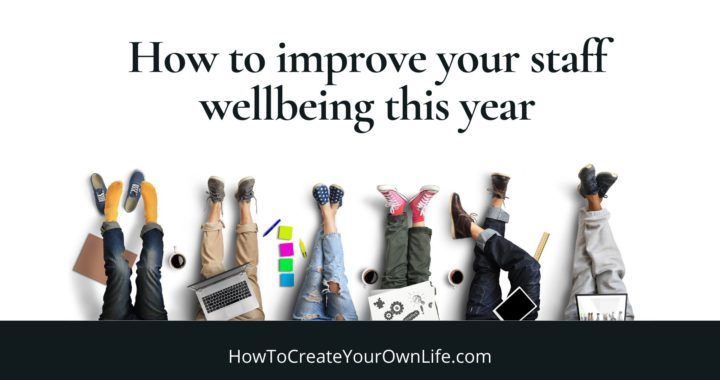In January, many of us turn our thoughts away from presents, potential snow and flying reindeer, and start to reexamine where we currently are in our life and the goals we hope to achieve in the coming year. Most of us try to forget the indulgences of the festive season by setting new year’s resolutions, joining a gym, promising to give up alcohol and carbs in the quest for a new, healthier regime in the months ahead. And sadly for most of us, our determination to succeed lasts a couple of weeks! As an employer, how can you help improve your staff wellbeing, and therefore, that of your business?
Most experts agree that there are 3 main areas of health that you can focus on to help people feel better – physical, mental and emotional wellbeing. I would obviously add in a 4th one, which is their spiritual wellbeing as well since I believe this to be equally, if not more important than the rest. However, this is for most people, a deeply personal matter. The other three are areas in which you might feel more able and qualified to help them in as their employer.
1. How to improve your staff wellbeing – Physical wellbeing

Physical wellbeing is not just about being fit and healthy but about being able to live life to the maximum. It means being able to play with children and grandchildren, partake in walks, cycle to work and enjoy the great outdoors. You don’t have to train all your staff to run a marathon, just help and encourage them to be the best they can be physically so that their physical health does not impede their general life. 
It’s well-known that people who regularly exercise are fitter than those who do not, but more and more evidence points to these people receiving improvements in their mental and psychological states too. In NLP we know that ‘state’ is linked to physiology. It’s difficult to feel depressed if you’re jumping around to your favourite song. Likewise, if you sit in a corner with your head in your hands, it’s more difficult to be optimistic.
So depending on your resources and budget, why not consider offering your staff (and yourself) some of the following:
- Set up a lunchtime fitness, running or power-walking group
- Offer weekly exercise classes such as keep fit, yoga, Pilates or Tai Chi. You might find that you have a member of your team who would like to lead this and set up a group so you can delegate some responsibility to them too.
- Discounted gym membership – you could contact your local gym and work with them to create a good deal for your staff
- Offer private staff medical insurance either fully subsidised or at a discount so that any physical or health problems that staff do encounter can be dealt with quickly and efficiently
- Encourage healthy eating by offering free fruit at break or lunchtimes
- Put up posters and run sessions on tackling obesity or invite nutrition experts in to talk to interested staff
- Ensure that your work patterns are manageable and do not create a culture where people’s work/life balance is affected – this will only prove counter-productive in the end if people feel that all they do is work; it leads to stress, discontentment and burnout so make sure you are aware of workloads and spread the work out accordingly.
Finally, really look at the stress levels in your organisation, however large or small. Stress is a major killer so ensure that you are not adding disproportionately to people’s stress and that stress management is tackled within your workplace. Stress has been shown to be a major cause of physical illness, depression and days lost at work so it is important to look out for it and take action to combat it.
Signs of stress to look out for in your teams include:
- Increased number of ‘sick’ days from team members
- Greater staff turnover
- Falling productivity
- Poor staff/management relations
- No laughter or banter between colleagues
- Everyone working late or a culture of ‘over-working’
A good way to monitor the stress levels in your team is to conduct a staff questionnaire such as the “Perceived Stress Scale” (PSS) which can be downloaded from: http://www.mindgarden.com/documents/PerceivedStressScale.pdf
2. Mental wellbeing

Mental wellbeing is finally achieving the recognition it deserves and people are more likely to talk about their mental health nowadays than in the past.
Some tools that are gaining popularity are meditation and mindfulness as more and more people report benefits from undertaking mindfulness or meditative practice. In recent years, there has also been more research into this area and studies have shown them to be beneficial in cases including fibromyalgia, psoriasis and post-traumatic stress disorder.
Some of these studies have only small study populations, but there are more robust data showing mindfulness and meditation can help with anxiety and depression. These have reported similar effects to other existing treatments such as anti-depressants or cognitive behavioural therapy and they are non-invasive and have few side effects.
One way to help your staff would be to engage a mindfulness coach who could offer your staff either some one-off training or preferably, a weekly mindfulness or meditation practice. The aim here is to improve your staff’s general mental wellbeing, reducing stress and increasing their ability to cope with stressful situations.

Another option to consider would be yoga. Depending on the type of yoga being done, yoga has been shown to have positive effects on the physical body as well as the mind. Yoga is an ancient form of meditative and physical practice and there are several different strands of yoga such as Hatha, power, yin or hot that you could consider. Each has a different goal and entails working in a slightly different way but you could try different ones to decide on the most appropriate strand for your staff.
You could encourage staff to join classes, offer subsidies or even set up a weekly class in your place of work. The benefits gained by helping your staff with breathing techniques, will help them reduce their stress and quieten their mind, leaving them more able to tackle everyday life.
3. Emotional wellbeing

People’s emotional wellbeing is connected to various different aspects of their personal lives including their family, finances, relationships, work and spiritual situation. Obviously, it is not within your remit as an employer to influence some of these personal issues but there are many areas where your attitude and work practices can have either a positive or negative impact.
When looking to improve the overall wellbeing of your staff, look at some of the following issues and take actions where necessary:
- Consider the communication between the management and staff – is it open and are there clear paths to follow if people need to talk
- Do your staff feel valued as individuals?
- Do they feel supported as part of an efficient team?
- Are there opportunities for staff to easily advance within your establishment?
- Do you offer CPD courses or other opportunities for staff improvement?
- Do your staff feel empowered? Do they feel their voice is being heard?
A simple way to offer staff a voice is by creating a ‘staff voice’ post box in which staff can anonymously leave messages and suggestions for improvements for senior staff. This can result in a more collaborative approach to changing things for the better.
You could also offer a mentoring programme and empower more experienced staff to mentor less-experienced staff. This works well if you employ trainees or apprentices or even just setting aside an hour each week to talk through issues with each other, even in a small office, can make a difference. When people know that there are other people ‘on their side’ who are willing to listen to them, it goes a long way in staff relations.
Other ways to promote staff emotional wellbeing include:
- Setting aside some days out for staff such as a half day off a month, or a visit to a museum or theatre trip
- Seasonal parties such as summer parties, Christmas or New Year celebrations
- Offering staff loyalty schemes or staff discount schemes such as Perkbox
- Setting up more formal opportunities to say ‘thank you’ to staff and recognise achievements
- “Employee of the week or month” schemes or other peer-to-peer recognitions
- Increased staff responsibilities – delegate and allow others to lead
- Professional employee recognition software programs that offer ways to track, monitor and reward staff such as Quarrot, Kudos and Peoplecart.
And finally, remember to also be kind and look after yourself too. It’s no good promoting staff wellbeing if you continue in your own workaholic, unhealthy lifestyle yourself. Be a good role model and however big or small your organisation, the benefits will be seen not just by you, but by your staff and your company too.

Articles related to “How to improve your staff wellbeing”:
20 Easy Self-Care Practices Anyone Can Do
Benefits Of Reducing Stress: Healing Body, Mind, And Soul
Beginner’s guide to meditation and its benefits





Great article. I agree with you that in addition to physical, mental, and emotional wellbeing, we need to work on our (and staff members) spiritual wellbeing. In my company, we set up a table tennis table as well as basketball pieces so that employees can be physically active. We also look to make the best possible communication among staff, and we often organize community gatherings and field trips. But in your post, there are many more ideas I will pay attention to and try to include some more.
Hi there. Thanks for your insight and the suggestion of a table tennis table is cool. At the school where I work, we also offer things for the staff and students to do at break times and that’s great. It’s a specialist school so we all have breaks together which also helps with staff/student relationships too. And the kids are always thrashing the adults at pool! Glad you found some other useful tips to and all the best for the coming year. Gail
This is essentially investing in your own staff to foster the betterment of your own work. I think this is very important and people should learn to make the best out of it. The emotional well-being I think is the most important thing because many people actually have issues with their emotional lives than any other thing. It’s good to see you give such awesome info. Nice one and I wish you a happy New year.
Hi Henderson. Thanks for your comment and Happy New Year to you too. I’m glad you found the article useful. I like that we are all now much more easy with talking about both emotional and mental health and companies that thriving are the ones that are treating their staff better and being mindful of their health. I’m still working on getting people to understand that spiritual health is important too since it connects us to our true power and true ability to heal ourselves. Still, I’m also happy to leave that one for another day and allow people to find out for themselves too. All the best. Gail
Hello Gail, I must say that this article is pretty helpful and informative. Last year was a disaster for me in the term of health so this year I will definitely pay more attention to my health and well being. You give some very useful tips and advice I can use in practice. Thank you for sharing your knowledge about improving ourselves, it is very important to work on that.
Hello Danijel. Sorry to hear you had a bad year last year but pleased you are paying more attention to yourself now. Truth be told, I’m probably in the same boat, although my health was pretty good, I know I can do better so that’s what I’m striving for this year too. After all, my mum is right when she says that “burning the candle at both ends, shortens the life of the candle!”